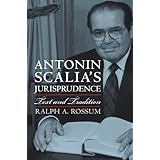
Average Reviews:

(More customer reviews)Are you looking to buy Antonin Scalia's Jurisprudence: Text and Tradition? Here is the right place to find the great deals. we can offer discounts of up to 90% on Antonin Scalia's Jurisprudence: Text and Tradition. Check out the link below:
>> Click Here to See Compare Prices and Get the Best Offers
Antonin Scalia's Jurisprudence: Text and Tradition ReviewAccomplished scholar Prof. Ralph Rossum has penned a well-crafted book analyzing the legal opinions and writings of U.S. Supreme Court Justice Antonin Scalia. The result is a solid read about how Justice Scalia views the role of a judge and how he sees himself. At least, Rossum gives his own take on how Justice Scalia sees himself. Obviously, the only person who truly knows how he sees himself is Justice Scalia.One of the two most interesting chapters is Chapter 2: "Text and Tradition." It summarizes Justice Scalia's textualist approach to statutory and constitutional interpretation. In short, when deciding a given case, the plain meaning of the words contained in statutes or constitution provisions matters. Where the plain text is unclear, a jurist should consult the tradition behind the text to understand what the words mean to those who adopted it. The original understanding of the text rather than any original or even secret intent should be controlling. Justice Scalia's approach is tied to an emphasis upon the democratic decision-making process as the basis for legitimate exercise of governmental authority. Not judicial adventurism and second-guessing of democratic decision-making evidenced by statutes and constitutional provisions.
This book is not lengthy. Nor is it written at a highly technical level. So although Rossum indicates on pg. 37 that Justice Scalia "simply has not developed a well-thought-out understanding of the principles of democracy," Rossum does not elaborate much on the point. One will just have to consult law review articles and the like for more in that regard.
The other chapter making for the most interesting reading is Chapter 3: "Constitutional Structure and Separation of Powers." This portion transitions nicely from the previous chapter and underscores the importance that governmental structure plays in Justice Scalia's views of the constitution. During his SCOTUS confirmation hearings, then-Judge Scalia testified that our division of federal power into three branches with a system of checks and balances has been crucial to the defense of our liberties. Rossum proceeds to analyze important separation of powers opinions written by Justice Scalia, including his infamous, lone-ranger dissent in Morrison v. Olsen (1988) concerning the Ethics in Government Act's provision for an independent counsel. At issue was the constitutionality of vesting the independent counsel of executive power despite its detachment from the President. Also important is Rossum's analysis of Justice Scalia's majority opinion in Printz v. United States (1997). The case is typically known as an anti-commandeering decision, but Rossum highlights the separation of powers rationale that Justice Scalia includes in the opinion.
Later chapters deal with Justice Scalia's approach to substantive individual rights and to individual procedural rights. Justice Scalia's textualist emphasis is to prevent "backsliding" or erosion of important freedoms by judicial re-interpretation of democratically-adopted protections.
Some familiarity with Justice Scalia's opinions or his book, A Matter of Interpretation, makes Rossum's book more worthwhile. But it is not essential. One need not be a lawyer to follow Rossum's overview. Nor need one even agree with Justice Scalia's approach to law or decisions in the cases discussed in the book to benefit from reading this book. The book has a sympathetic tone towards its subject, but it is not an advocacy publication. Rossum even insists while Justice Scalia is remarkably consistent in his jurisprudence that he is nonetheless inconsistent in a few areas of law (e.g., state sovereign immunity.)
Rossum set out to describe the jurisprudence of perhaps the most interesting and discussed jurist on SCOTUS today. The author succeeds and the product is an accessible, informative, and interesting read.Antonin Scalia's Jurisprudence: Text and Tradition OverviewLionized by the right and demonized by the left, Supreme Court Justice Antonin Scalia is the high court's quintessential conservative. Witty, outspoken, often abrasive, he is widely regarded as the most controversial member of the Court.This book is the first comprehensive, reasoned, and sympathetic analysis of how Scalia has decided cases during his entire twenty-year Supreme Court tenure. Ralph Rossum focuses on Scalia's more than 600 Supreme Court opinions and dissents-carefully wrought, passionately argued, and filled with well-turned phrases-which portray him as an eloquent defender of an "original meaning" jurisprudence. He also includes analyses of Scalia's Court of Appeals opinions for the D.C. circuit, his major law review articles as a law professor and judge, and his provocative book, A Matter of Interpretation. Rossum reveals Scalia's understanding of key issues confronting today's Court, such as the separation of powers, federalism, the free speech and press and religion clauses of the First Amendment, and the due process and equal protection clauses of the Fourteenth Amendment. He suggests that Scalia displays such a keen interest in defending federalism that he sometimes departs from text and tradition, and reveals that he has disagreed with other justices most often in decisions involving the meaning of the First Amendment's establishment clause. He also analyzes Scalia's positions on the commerce clause and habeas corpus clause of Article I, the take care clause of Article II, the criminal procedural provisions of Amendments Four through Eight, protection of state sovereign immunity in the Eleventh Amendment, and Congress's enforcement power under Section 5 of the Fourteenth Amendment.The first book to fully articulate the contours of Scalia's constitutional philosophy and jurisprudence, Rossum's insightful study ultimately depicts Scalia as a principled, consistent, and intelligent textualist who is fearless and resolute, notwithstanding the controversy he often inspires.
Want to learn more information about Antonin Scalia's Jurisprudence: Text and Tradition?
>> Click Here to See All Customer Reviews & Ratings Now